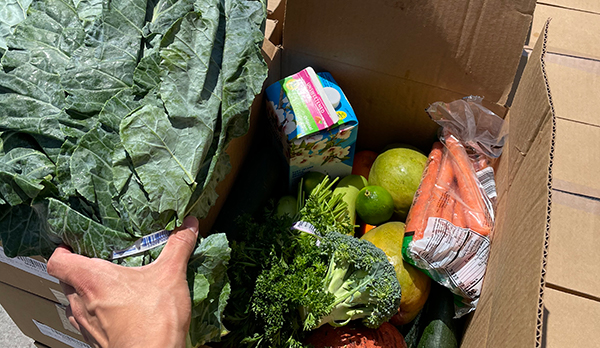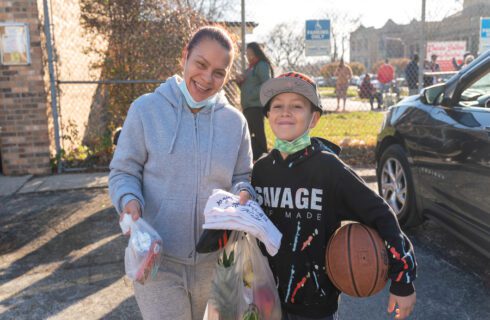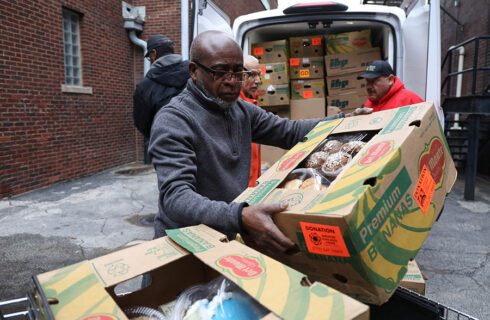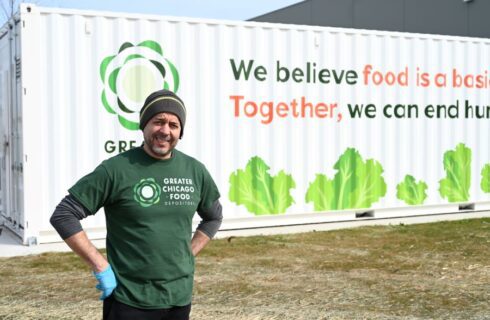By Michael J. O’Loughlin
In normal times, the Center on Halsted hosts a robust schedule of meals and social activities geared toward LGBTQ older adults, including lunches, parties and social outings.
For many of those attending, including residents in the nearly 80 rental units of senior housing attached to the Center on Halsted’s senior center, the gatherings served as an opportunity to socialize and stay connected to their North Halsted community. But when the coronavirus shut down Chicago last year, the Center was forced to move many of its offerings online.
In addition to losing the camaraderie, many of those served by the Center suddenly faced another crisis exacerbated by the shutdown.
“Food insecurity emerged as one of the most pressing needs faced by many of our clients,” said Britta Larson, the senior services director at the Center on Halsted, a community health center serving LGBTQ community in the Chicago area.
Though LGBTQ Americans have seen rapid advancements in both societal acceptance and civil rights protections in recent years, food insecurity continues to affect the community at higher rates than the general population. The Greater Chicago Food Depository proudly partners with several organizations that are working to directly address that injustice, including the Center on Halsted, The Night Ministry, Care for Real and Brave Space Alliance.
“Love is love,” said Nicole Robinson, the Food Depository’s chief partnership and programs officer. “And at the Food Depository, we firmly believe that no one should go hungry, regardless of who you love or any other identifying factor. We're so grateful for our community partners working to lift up the LGBTQ community here in Cook County.”
Support in a crisis
To help meet the needs of their guests, the Center on Halsted turned to its community for support. Neighbors dropped off donations. Local restaurants offered meals. And the Food Depository responded by providing much needed boxes of shelf-stable groceries, such as canned fruits and vegetables, rice, beans, pasta and other goods.
Some residents of the Town Hall Apartments – the apartments affiliated with the Center and the Heartland Alliance geared toward LGBTQ older adults – have the boxes delivered to their homes. Others who live out in the community either swing by to retrieve them or have them delivered by volunteers.
Food insecurity emerged as a pressing need in the crisis.
“Already-made lunch or dinner is lovely, but that's not going to be enough food for the whole week,” Larson said. “And so the boxed goods help supplement all of that and rounds out the ways that we address food insecurity.”
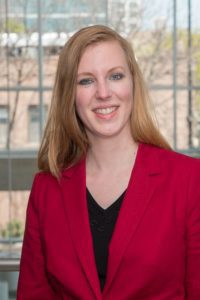
Britta Larson, senior services director at Center on Halsted (Contributed photo)
Madeline Hall lives near the Center and attended its social gatherings before the shutdown. Once the pandemic hit, she said, she learned that many of her neighbors had relied on the in-person meals as a primary source of nutrition. They were now at risk of not having enough to eat.
Hall stepped up, picking up boxes of food at the Center and delivering them to friends and neighbors in her building. Without food assistance programs, she said, many of her neighbors would be forced into making tough choices.
“People have to figure out if it’s more important to buy their medicine or if they can buy some soup or beans or rice,” she said.
Gaps in access
About 27 percent of LGBTQ adults in the United States “experienced a time in the last year when they did not have enough money to feed themselves or their family,” compared to 17 percent for non-LGBTQ adults, according to a 2016 study from the Williams Institute at UCLA's School of Law.
“There's a myth about the LGBTQ community being an overall wealthy community,” said Dr. Joanne Patterson, a health equity scholar at The Ohio State University Comprehensive Cancer Center. “What we actually see is there's a fair amount of underemployment, unemployment and wage differentials that negatively affects the LGBTQ community, including a lot of workplace hiring discrimination, resulting in poverty within LGBTQ populations.”
In her own research, Patterson found that transwomen, gender-nonconforming people and women who identify as lesbian or bisexual tend to have lower incomes compared to the general population and to gay men, which can lead to increased food insecurity.
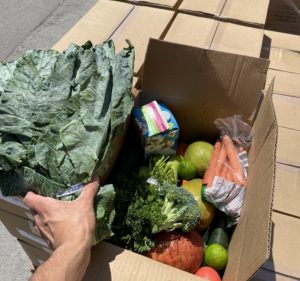
A look at the food boxes provided in partnership with Brave Space Alliance. (Photo courtesy of Brave Space Alliance)
Organizations that provide nutrition assistance must make a special effort to reach the LGBTQ community and ensure them that they will feel welcome when they seek help, especially for people who are gender non-conforming, Patterson said.
“We want to identify where there might be gaps in access,” Patterson said. “Food insecurity is about access and availability as much as it is about utilizing those resources and having enough nutritious and adequate food to eat. If we're talking about food insecurity globally and we're not looking at where the gaps are, we're never going to fill them.”
More than 1 in 4 LGBTQ adults in the United States have experienced food insecurity, according to one study.
Since May, the Food Depository has partnered with Brave Space Alliance, a Black- and transgender-led nonprofit in Hyde Park that’s dedicated to serving LGBTQ people on the South and West Sides. Brave Space coordinates the distribution of about 180 boxes of food each week with their partner organization, Rincon Family Services, in the Albany Park neighborhood.
During the pandemic, Brave Space Alliance has grown its food assistance programs as the need has dramatically increased, said Moses Viveros, crisis pantry network program coordinator for Brave Space. The grab-and-go nature of the food box distribution, as well as the familiarity of seeing members from the community, helps to reduce the anxiety for LGBTQ people who might be reluctant to visit a pantry for fear of discrimination, Viveros said.
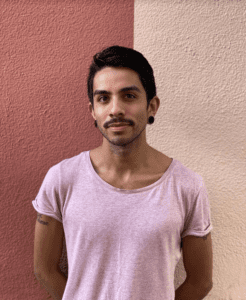
Moses Viveros, crisis pantry network program coordinator for Brave Space Alliance (Contributed photo)
“Let’s listen to these communities and allow them to have some kind of decision-making in whatever structure they’re working within,” said Viveros, who prefers the gender-neutral pronouns they and them.
“When we’re talking about how to best meet the needs of LGBTQ folks experiencing food insecurity, this particular community is not always at the table to share their experiences and provide their input,” they said.
‘Make them feel at home’
Food insecurity can be a symptom of wider challenges facing LGBTQ people, such as a lack of stable employment or housing.
The Interim Housing Program, one of the five youth shelters run by the Chicago-based social services nonprofit the Night Ministry, houses up to 16 young people at a time, said Terry Williams, who manages the food program at the shelter. Stays ranging from just a few days for those ages 14 to 17 to several months for those who are 18 or older.
Many of the guests who identify as LGBTQ have left home situations where they did not feel accepted, he said.
“They feel more comfortable being on the street as opposed to being at home around family members who were not accepting,” Williams said. “When they come here, we try to make them feel at home.”
Part of that welcome includes counseling, weekend excursions, and help with mastering life skills such as maintaining a budget and cooking healthy meals. Those culinary lessons are often made possible with food that the Night Ministry receives from the Food Depository, including dry goods as well as produce, poultry, and fish.
“The kids are responsible for cooking themselves, with staff assistance,” Williams said. “We're to assist them around in the kitchen if they need help, but the goal is to try to teach them how to do it on their own.”
'We want to serve you'
It’s important for food pantries and other social service agencies to ensure that their outreach to the LGBTQ community is targeted, and their staffs are well-resourced and informed about best practices when it comes to serving LGBTQ people, said Patterson, the Ohio State researcher.
Care for Real, a longtime Food Depository partner on the North Side that provides the equivalent of 1.6 million meals each year, is doing just that.
The Edgewater organization strives to provide a safe and supportive environment when LGBTQ guests seek help, which includes food from the Food Depository, said executive director Gregory Gross, who is a gay man and an ordained minister in the United Methodist Church.
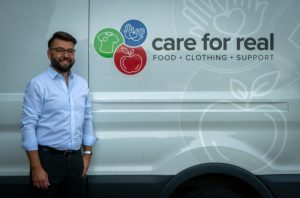
Gregory Gross, executive director of Care for Real (Contributed photo)
Care for Real equips its staff members with the tools to understand how to make sure LGBTQ people feel welcome, Gross said, and the nonprofit has recently updated forms and signage to be gender inclusive.
“Once we do outreach, we're saying, ‘here we are, we want to serve you,’” he said. “But we also don't want to do harm in the midst of providing a service.”
In addition to food, Care for Real provides housing and medical assistance, a clothing closet, and pet food, among other services.
“Over the past year, during the pandemic, (the Food Depository has) been providing large amounts of food for us to distribute to our community,” he said, adding that Care for Real also received financial support from the Food Depository in the form of grants that allowed operations to continue during uncertain times.
“We're extremely grateful for the partnership.”
Michael J. O’Loughlin is a Chicago-based journalist and author of “Hidden Mercy: AIDS, Catholics and the Untold Stories of Compassion in the Face of Fear,” which is due out in November 2021. He’s also a member of the Association of LGBTQ Journalists.
Share This Post

